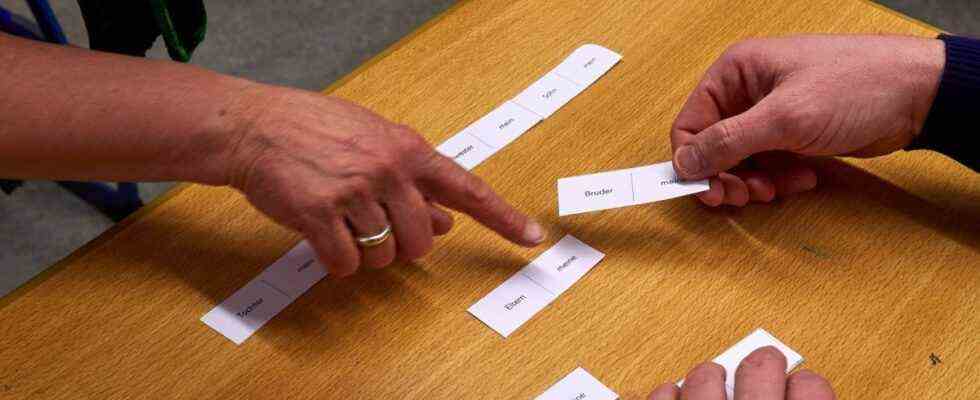Course participant Mina already speaks three languages: English, Danish and Romanian. The young woman currently speaks English mainly at work, she learned Danish during a ten-year stay in Denmark and in Romanian she is currently trying to explain the rules of the domino game to her classmate. For Mina, it goes without saying that she is now also learning German. “New country, new language,” she says, albeit in English to be on the safe side. “I moved to Germany, so I have to learn German too. It’s that simple.”
German course at the adult education center in Vaterstetten. Brigitte Wever is standing at the desk with a pile of papers in her hand. It’s the last hour of the beginner’s German course. At the end of the semester, she hands over certificates of attendance to her students. They accept the certificates with a big smile. They don’t really know what to do with the term “certificate of participation”. After all, this is a difficult word and the students in this course have not been learning German for very long. In recent years, Wever has always distributed ten to 15 certificates. Today there are only three, because the number of participants has fallen sharply due to Corona.
Brigitte Wever in the German course with three of the six participants, including Mina.
(Photo: Peter Hinz-Rosin)
“More are not coming today,” explains Wever. Half of the six students in her course stayed at home due to illness. Accordingly, the classroom seems empty today. But Wever is happy that her course has at least been able to take place again in attendance for a few months. That wasn’t possible for a long time during the pandemic.
“50 to 75 percent of the course participants no longer came – even when face-to-face courses took place again”
“Within a very short time we had to switch to online,” says Annette Lölkes. She is a lecturer for German as a foreign language and gives several courses at different levels at the adult education center in Vaterstetten. Many course participants did not speak German well enough or did not have a computer to take part in the online lessons. Brigitte Wever’s beginner’s course had to be canceled entirely. “50 to 75 percent of the course participants no longer came – even when face-to-face courses took place again,” says Lölkes.
Brigitte Weever.
(Photo: Peter Hinz-Rosin)
Why is that? “Due to the pandemic, many migrants were worried about their jobs,” explains the lecturer. “The German course just wasn’t the top priority.” The two course instructors see another problem in the 2G regulation. Some of the participants are not vaccinated. There are various reasons for this: “Many get their information primarily from local news in their mother tongue and are therefore rather suspicious of the vaccination,” suspects Lölkes. Wever is also not sure how well the need for vaccination regarding the German courses goes down with her students. They do get emails with all the information from the VHS, but in German. Career changers who want to join in the middle of the year may not know beforehand that a vaccination is required for participation. In addition, demand has fallen in general because fewer guest workers and au pairs are coming due to the pandemic.
Both German teachers hope that more participants will register again in the future. “Once you’ve lost the thread, it’s difficult to get back on track,” says Lölkes. “It’s like with the gyms: when they opened again after the pandemic, it was difficult to motivate yourself to do sports again.” The same applies to the language courses. Especially in adulthood you forget things more quickly.
“Language means integration”
Many migrants don’t see the same need to learn German as Mina does. They choose the easier way and stay among people who speak their language. Why is it so important for these people to learn German? “Language means integration,” says Lölkes. Language skills also increase chances on the job market. And: “For many, the clock is ticking,” she adds. Many of the course participants are refugees with a Duldung – this is granted if deportation is not possible. Among other things, a language level is required for a permanent stay in Germany. You receive such proof by participating in a VHS German course.
Those present were not discouraged by the small number of participants. Today’s topic is family members. Wever is a social worker and tries to teach the participants the words in a playful way. As in a game of dominoes, the students have to match terms of family members with suitable articles. “People come here from a wide variety of countries and often don’t speak any German and hardly any English,” says the course leader. “So we communicate a lot with hands and feet.”

